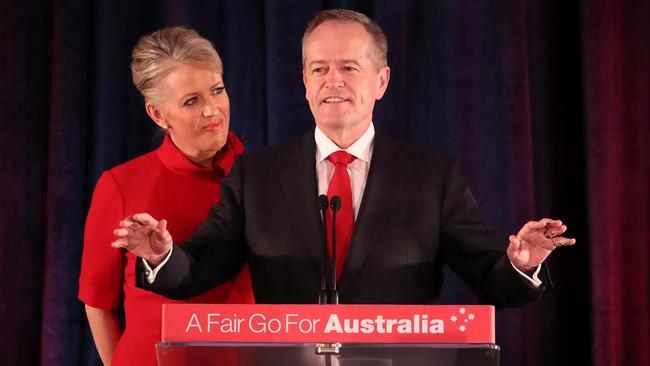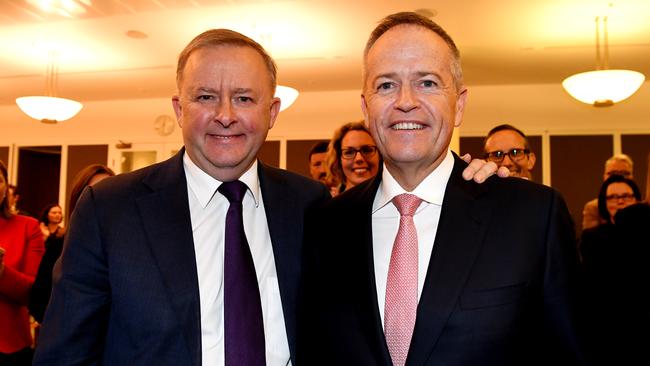ALP election review: 26 ways to fix broken Labor
Labor stalwarts Jay Weatherill and Craig Emerson chronicle how the ALP can rebuild after May’s election defeat | FULL LIST

Labor’s federal election loss has been put down to a combination of Bill Shorten’s unpopularity, a “cluttered” policy agenda, and a failure to adapt to the ascension of Scott Morrison as prime minister. The report, led by Jay Weatherill and Craig Emerson, savages the campaign culture which did not allow strategies to be challenged. Here are 26 of their recommendations.
Recommendation 1: Labor should retain its core values, including improving the job opportunities, security and conditions of working Australians, fairness, non-discrimination on the basis of race, religion and gender, and care for the environment.
Recommendation 2: The campaign policies offered can be bold but should form part of a coherent Labor story, be more limited in number and complexity, and be easily explainable so they are less capable of misrepresentation.
Recommendation 3: Labor should position itself as a party of economic growth and reform, job creation and rising living standards, drawing upon and expanding on its past economic reforms.
READ MORE: Labor election review: Shorten unpopular, no clear message | Shorten lays blame for shock loss | Shorten allies: don’t scapegoat ex-leader | Labor loss more than franking credits: Bowen | ‘Climate failures cost us’ | Shorten: I misread the mood in Queensland, WA | Bramston: ALP should have left Albanese on the shelf | ALP denied Shorten’s cry for help
Recommendation 4: Labor should adopt the language of inclusion, abandoning divisive rhetoric, including references to “the big end of town”.
Recommendation 5: Labor’s policy formulation process should be guided by its strategy and the national interest, avoiding any perception of capture by sectional interests. Improving Labor’s standing with disaffected voters.
Recommendation 6: Without compromising existing support, Labor should broaden its support base by improving its standing with economically insecure, low-income working families, groups within the Christian community and Australians living in regional and rural Australia.

Recommendation 7: Labor should develop a coherent strategy for engaging more fully with culturally and linguistically diverse communities, including Chinese Australians.
Recommendation 8: Labor should pursue legislation capping individual political donations and legislation for truth in political advertising.
Recommendation 9: A formal campaign committee should be established early and should include representatives of the Party and the leadership group. It should liaise with ALP state and territory secretaries in the formulation of the campaign strategy and encourage a culture of open dialogue.
Recommendation 10: Campaign policies should be released at a time that allows them to be discussed and understood but not so early as to divorce them from the likely circumstances pertaining at the time of the election. Local commitments should be timed in such a way as to allow candidates to promote them within their electorates.
Recommendation 11: Labor should focus on fewer target seats and do more to ensure robust local campaign organisations are in place.

Recommendation 12: A centralised First Nations campaign structure should be designed with input from the First Nations Caucus and the National Indigenous Labor Network.
Recommendation 13: A project should be established to identify best practice in relation to engagement with culturally and linguistically diverse communities for the purpose of promoting this across the Labor network.
Recommendation 14: Labor should achieve greater gender diversity in its campaign teams.
Recommendation 15: The National Secretary and State and Territory Secretaries should develop targeted campaign engagements aimed at restoring Labor’s Senate primary vote
Recommendation 16: The National Secretary should commence a research procurement process before the end of 2019, with pre-established standards and expectations around quality and reliability. This process should deliver long-term contracts that assign research responsibilities to different providers.

Recommendation 17: Labor’s research program should inform its campaign strategy independent of day-to-day tactical demands and deliver a set of strategic principles that guide the next campaign. These principles should be embedded in the Opposition’s policy development and strategic decision-making process.
Recommendation 18: Research providers should be given opportunities to debate and critique research findings across methods. This should include collaboration between qualitative, quantitative and data researchers.
Recommendation 19: The National Secretariat should continue to identify opportunities for research collaboration and the sharing of resources with state and territory branches. The National Secretariat should also continue exploring and adopting innovative research methods.
Recommendation 20: The National Secretary must have the sole responsibility for determining the allocation of research program responsibilities within the campaign but must ensure there is a clear delegation of operational duties.
Recommendation 21: Labor’s next national campaign should be driven by a “digital-first” model that is fit for the digital age.
Recommendation 22: Labor must develop a comprehensive strategy for message defence and combating disinformation, which should include full-time resources dedicated to monitoring and addressing false messages.

Recommendation 23: The ALP’s National Platform should be reviewed and focused on values and principles, with the development of policy detail and the timing of releasing policies being the responsibility of the shadow ministry and the leadership group.
Recommendation 24: As an outcome of the review of the National Platform, it should remain bold but be streamlined and simplified.
Recommendation 25: The ALP’s National Conference should be held by the end of 2020.
Recommendation 26: The National Secretary should be responsible for the implementation of the recommendations and should be asked by the National Executive to prepare an implementation plan reporting quarterly to the National Executive Committee and annually to the National Executive.



To join the conversation, please log in. Don't have an account? Register
Join the conversation, you are commenting as Logout